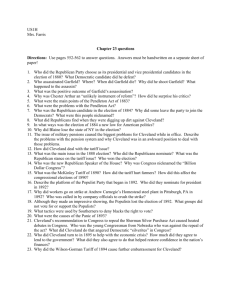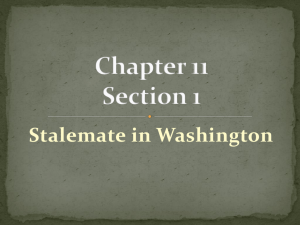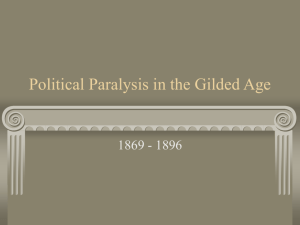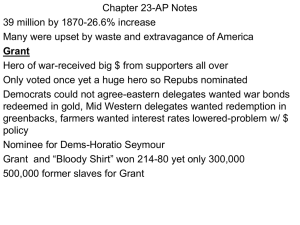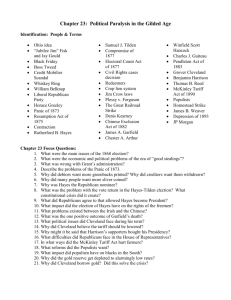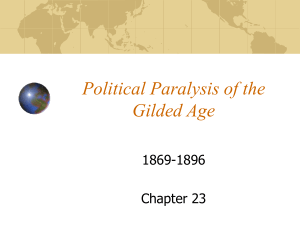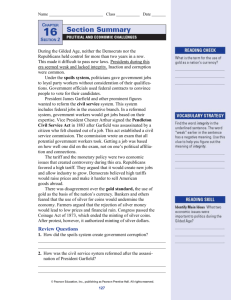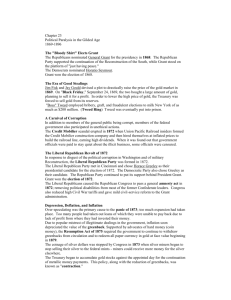Chapter 23 - s3.amazonaws.com
advertisement
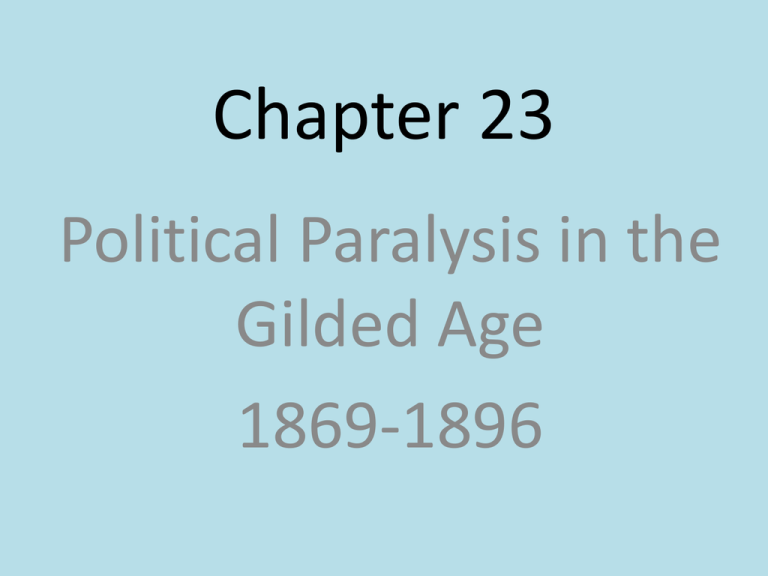
Chapter 23 Political Paralysis in the Gilded Age 1869-1896 Grant Elected President • The Republicans nominated General Grant for the presidency in 1868. • The Republican Party supported the continuation of the Reconstruction of the South, while Grant stood on the platform of "just having peace." • The Democrats nominated Horatio Seymour. • Grant won the election of 1868. Era of Good Stealings • Jim Fisk and Jay Gould devised a plot to drastically raise the price of the gold market in 1869. – "Black Friday," September 24, 1869, the two bought a large amount of gold to sell for a profit. In order to lower the high price of gold, the Treasury was forced to sell gold from its reserves. Fisk and Gould did not make a huge profit, but the government lost money. Boss Tweed • "Boss" Tweed employed bribery, graft, and fraudulent elections to milk New York of as much as $200 million. (Tweed Ring) Tweed was eventually put into prison. Credit Mobilier • 1872 - Union Pacific Railroad insiders formed the Credit Mobilier construction company and then hired themselves at high prices to build the railroad line, embezzling a lot of money – When it was found out that government officials were paid to stay quiet about the illicit business, some officials were censured. Liberal Republicans • In response to disgust of the political corruption in Washington and of military Reconstruction, the Liberal Republican Party was formed in 1872. • The Liberal Republican Party met in Cincinnati and chose Horace Greeley as their presidential candidate for the election of 1872. • The Democratic Party also chose Greeley as their candidate. The Republican Party continued to put its support behind President Grant. Grant won the election of 1872. • The Liberal Republicans caused the Republican Congress to pass a general amnesty act in 1872; removing political disabilities from most of the former Confederate leaders. • Congress also reduced high Civil War tariffs and gave mild civilservice reform to the Grant administration. Panic of 1873 • Over-speculating was the primary cause; too much expansion had taken place. – Too many people had taken out loans of which they were unable to pay • Mistrust of the government and inflation soon depreciated the value of the greenback. – Resumption Act of 1875 required the government to continue to withdraw greenbacks from circulation and to redeem all paper currency in gold at face value beginning in 1879. • Coinage of silver dollars was stopped by Congress in 1873 when silver miners began to stop selling their silver to the federal mints - miners could receive more money for the silver elsewhere. • Treasury began to accumulate gold stocks to prepare for 1879 (trade paper money for gold) – This policy, along with the reduction of greenbacks, was known as "contraction." • Redemption Day (1879) few holders of greenbacks redeemed them for gold – Greenback's value had increased due to its reduction in circulation. • The Republican hard-money policy had a political backlash and helped to elect a Democratic House of Representatives in 1874. The Gilded Age • Name given to the 30 years after the Civil War era by Mark Twain • The political parties in government had balanced out. • Few significant economic issues separated the Democrats and the Republicans. Republicans • Stressed strict codes of personal morality • Believed that the government should play a role in regulating the economic and the moral affairs of society. – They were found in the Midwest and Northeast. – Many Republican votes came from the Grand Army of the Republic, a politically active fraternal organization of many Union veterans of the Civil War. Democrats • Immigrants • Lutherans and Roman Catholics who believed in toleration of differences in an imperfect world. – Opposed the government imposing a single moral standard on the entire society. – Democrats were found in the South and in the northern industrial cities. Stalwarts • A "Stalwart" faction led by Roscoe Conkling supported the system of swapping civilservant jobs for votes. – Giving someone a job if they vote for a specific party/cause. "Spoils system" – Opposed to the Stalwarts were the Half-Breeds, led by James G. Blaine. – The main disagreement between the two groups was over who would give the jobs to the people who voted in their favor. Hayes-Tilden Standoff • Congress passed a resolution that reminded the country, and Grant, of the two-term tradition for presidency after Grant was speculating about running for a 3rd term. • The Republicans chose Rutherford B. Hayes as their presidential candidate for the election of 1876. The Democrats chose Samuel J. Tilden. • In the election, Tilden won the popular vote, but was 1 vote shy from winning in the Electoral College. – The determining electoral votes would come from three states, Louisiana, South Carolina, and Florida who had each sent two sets of ballots to Congress, one with the Democrats victorious and the other with the Republicans victorious; there was no winner in these states. • It was necessary to find the true political party winner of the states, although it was unknown who would judge the winner of the states because the president of the Senate was a Republican and the Speaker of the House was a Democrat. The Compromise of 1877 Ends Reconstruction • The Electoral Count Act (Compromise of 1877), passed by Congress in 1877, set up an electoral commission consisting of 15 men selected from the Senate, the House of Representatives, and the Supreme Court. – It was made to determine which party would win the election. – The committee finally determined, without opening the ballots from the 3 disputed states, that the Republicans had been victorious in the disputed ballots from the three states, giving the Republicans the presidency. • The Democrats were outraged at the outcome, but agreed that Republican Hayes could take office if he withdrew the federal troops from Louisiana and South Carolina. • With the Hayes-Tilden deal, the Republican Party abandoned its commitment to racial equality. Civil Rights Act of 1875 • Supposedly guaranteed equal accommodations in public places and prohibited racial discrimination in jury selection. – The Supreme Court ended up ruling most of the Act unconstitutional, declaring that the 14th Amendment only prohibited government violations of civil rights, not the denial of civil rights by individuals. Birth of Jim Crow • As Reconstruction had ended in the South, white Democrats resumed their political power in the South and began to exercise their discrimination upon blacks. • Blacks were forced into sharecropping and tenant farming. – Through the "crop-lien" system, small farmers who rented out land from the plantation owners were kept in perpetual debt and forced to continue to work for the owners. • Eventually, state-level legal codes of segregation known as Jim Crow laws were enacted. – The Southern states also enacted literacy requirements, voterregistration laws, and poll taxes to ensure the denial of voting for the South's black population. Plessy v. Ferguson • The Supreme Court ruled in favor of the South's segregation in the case of Plessy vs. Ferguson (1896), declaring that separate but equal facilities for blacks were legal under the 14th Amendment. Problems of the Gilded Age • Following the panic of 1873 and the resulting depression, railroad workers went on strike after their wages were cut by President Hayes. – The strike failed, exposing the weakness of the labor movement. • Masses of immigrants came to United States in hopes of finding riches, but many were dismayed when they found none. – They either returned home or remained in America and faced extraordinary hardships. • People of the West Coast attributed declining wages and economic troubles to the hated Chinese workers. – To appease them, Congress passed the Chinese Exclusion Act in 1882, halting Chinese immigration into America. Garfield and Arthur • Because President Hayes was despised by his own Republican Party, James A. Garfield was chosen as the presidential candidate for the election of 1880. • His vice-president was Chester A. Arthur, a former Stalwart. • The Democrats chose Civil War hero, Winfield Scott. • Garfield won the election of 1880, but was assassinated by Charles J. Guiteau at a Washington railroad station. – Guiteau, claiming to be a Stalwart, shot the president claiming that the Conklingites would now get all the good jobs now that Arthur was President. • The death of Garfield shocked politicians into reforming the spoils system. – The reform was supported by President Arthur, shocking his critics. • The Pendleton Act of 1883 made campaign contributions from federal employees illegal, and it established the Civil Service Commission to make appointments to federal jobs on the basis of competitive examination. – It was basically made to stop political corruption. The civil-service reform forced politicians to gain support and funds from big-business leaders. Election of Cleveland • The Republicans chose James G. Blaine as their presidential candidate for the election of 1884. • The Democrats chose Grover Cleveland. – Grover Cleveland was a very honest and admirable man. Cleveland won the election of 1884. • Questions were raised about whether Cleveland and the Democratic Party, "the party of disunion," could be trusted to govern the Union. • Cleveland replaced thousands of federal employees with Democrats. • Cleveland summed up his political philosophy when he vetoed a bill in 1887 to provide seeds for drought-ravaged Texas farmers, stating that the government should not support the people. • The Grand Army of the Republic lobbied hundreds of unreasonable military pension bills through Congress, but Cleveland vetoed many of the bills. Tariff Battle • The growing surplus of money in the Treasury coming from the high tariff, which was made to raise revenues for the military during the Civil War, caused President Cleveland to propose lowering of the tariff in order to bring lower prices to consumers. – The lower tariff, introduced to Congress in 1887 and supported by Cleveland, tremendously hurt the nation's factories and the overall economy. Cleveland lost support because of the tariff. • The Republicans chose Benjamin Harrison as their presidential candidate for the 1888 election. • During the election, the first major issue between the two parties had arisen: tariffs. Cleveland won the popular vote, but Harrison still won the election. The Billion Dollar Congress • When the Democrats were prepared to stop all House business, the Speaker of the House, Thomas B. Reed, took control and intimidated the House to his imperious will. • The Billion-Dollar Congress, named for its lavish spendings, gave pensions to Civil War veterans, increased government purchases on silver, and passed the McKinley Tariff Act of 1890. – The McKinley Tariff Act raised tariffs yet again and brought more troubles to farmers. – Farmers were forced to buy expensive products from American manufacturers while selling their own products into the highly competitive world markets. • The Tariff Act caused the Republican Party to lose public support and become discredited. • In the congressional elections of 1890, the Republicans lost their majority in Congress. Rise of the Populist Party • The People's Party, or "Populists," formed from frustrated farmers in the agricultural belts of the West and South. – The Populists demanded inflation through free and unlimited coinage of silver. – They also called for a graduated income tax; government ownership of the railroads, telegraph, and telephone; the direct election of U.S. senators; a oneterm limit on the presidency; the adoption of the initiative and referendum to allow citizens to shape legislation more directly; a shorter workday; and immigration restriction. • The Populists nominated General James B. Weaver for the presidential election of 1892. • In 1892, a series of violent worker strikes swept through the nation. • The Populist Party fell far short of winning the election. – One of the main reasons was that the party supported and reached out to the black community. – Its leaders, such as Thomas Edward Watson, felt that a black man had every right to vote. – The Populist Party counted on many blacks votes from the South. – Many Southern blacks were denied the right to vote due to literacy tests. – The Southern whites voted against the party due the party's equal rights views toward blacks. Election of Cleveland (Again) • Grover Cleveland again ran for the presidency in the election of 1892 and won, beating out the divided Populist Party and the discredited Republican Party. • Panic of 1893 - worst economic downturn for the US during the 19th Century. – Caused by overbuilding and over-speculation, labor disorders, and the ongoing agricultural depression. • Treasury was required to issue legal tender notes for the silver bullion that it had purchased that owners of paper currency would trade for gold, and by law the notes had to be reissued. This process depleted the gold reserve in the Treasury to less than $100 million. • Sherman Silver Purchase Act of 1890 was created by the administration of Benjamin Harrison to increase the amount of silver in circulation. – Drastic rise in silver caused the American people to believe that the less expensive silver was going to replace gold as the main form of currency. – The American people therefore began to withdraw their assets in gold, depleting the Treasury's gold supply. – Cleveland was forced to repeal the Sherman Silver Act Purchase in 1893. • Cleveland turned to J.P. Morgan to lend $65 million in gold in order to increase the Treasury's reserve. (Good business sense – bad for public opinion because people thought Cleveland sold the government to Morgan) End of the Forgettable Presidents • The Wilson-Gorman Tariff of 1894 lowered tariffs and contained a 2% tax on incomes over $4,000. The Supreme Court ruled income taxes unconstitutional in 1895. • The Wilson-Gorman Tariff caused the Democrats to lose positions in Congress, giving the Republicans an advantage. • Grant, Hayes, Garfield, Arthur, Harrison, and Cleveland were known as the "forgettable presidents.“ • All except for Cleveland were Republicans
